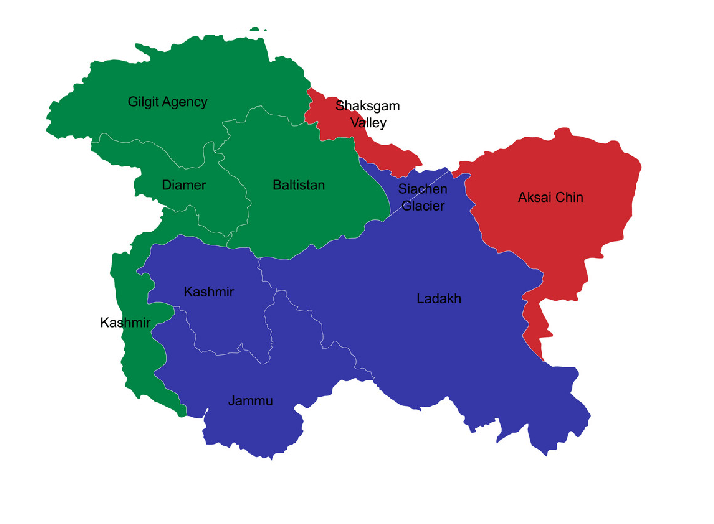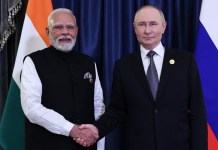China on Monday urged India and Pakistan to resolve their dispute over Jammu and Kashmir “properly and peacefully.”
“China’s position on the Kashmir issue is consistent and clear. It is an issue left over from history between India and Pakistan which should be resolved properly and peacefully in accordance with the UN Charter, relevant Security Council resolutions and bilateral agreements,” said Zhao Lijian, China’s Foreign Ministry spokesman, addressing a news conference in Beijing, according to a Foreign Ministry statement.
He was responding to a question over escalations between Indian and Pakistani troops along the dividing Line of Control last week which resulted in the deaths of at least 15 people, including soldiers on the two sides.
Terming India and Pakistan “important countries” in South Asia, Zhao said: “Harmonious co-existence between the two sides is vital to regional peace, stability and development. As a neighbor of both countries, China calls on the two sides to exercise restraint, resolve differences through dialogue, and jointly safeguard regional peace and stability.”
On Pakistan’s “irrefutable evidence” of alleged Indian “state-sponsored terrorism” in Pakistan, the Chinese foreign ministry spokesman said: “China opposes all forms of terrorism and calls on the international community, regional countries in particular, to carry out counter-terrorism cooperation and safeguard collective security.”
Pakistan has accused India of running a network of “terror cells and camps in Afghanistan and on Indian soil” to foment trouble inside Pakistan.
In a joint press conference last Saturday, Pakistani Foreign Minister Shah Mahmood Qureshi and military Spokesman Gen. Iftikhar Babar played footage and audio of alleged Indian handlers of suspected terrorists. The duo also claimed to have found “cell phone numbers of bank transactions for the sabotage.”
A day later, Qureshi accused India of “conspiring to damage the China-Pakistan Economic Corridor (CPEC) project by creating unrest in the country.”
The CPEC is a flagship project of China’s mammoth Belt and Road Initiate (BRI).
“Pakistan had solid proof that India was trying to create a law and order situation in the country,” he alleged, adding India had spent billions of rupees for the purpose.
India has denied the allegations.
However, the Chinese Foreign Ministry spokesman said “CPEC, as a major pioneering project of the BRI, is important not only to the common development of China and Pakistan but also to regional connectivity and common prosperity.”

“We are confident that with the support of the international community, China and Pakistan will ensure the smooth and successful building and running of CPEC. We also believe that Pakistan will continue to take effective measures to ensure CPEC’s security,” Zhao added.
Pakistan Rejects Indian Dossier
Pakistan on Monday rejected India’s response to a “dossier” in which Islamabad accused its longtime rival of “sponsoring” terrorism.
“Pakistan categorically rejects the Indian Ministry of External Affairs’ denial of the irrefutable evidence on Indian state sponsorship of terrorism,” Pakistan’s Foreign Ministry said in a statement.
“Fully exposed, India has typically resorted to sophistry, obfuscation and re-fabrication. Bland denials and regurgitation of an old litany of charges, however, will not change facts,” it added.
The dossier, the statement claimed, extensively documents India’s “active planning, promoting, aiding, abetting, financing and execution of terrorist activities against Pakistan.”
Since 2001, Pakistan has faced more than 19,000 terrorist attacks on its soil and suffered 83,000 causalities, in addition to the economic losses of $126 billion, according to the statement.
The statement further read, India has “mischievously” masqueraded as a “victim” of terrorism and sought to mislead the international community by hypocritically leveling terrorism-related allegations against Pakistan.
Islamabad also accused New Delhi of conducting “false flag” operations in disputed Jammu and Kashmir, and inside India to “malign” Pakistan.
“That façade has now been removed and the world can see the real face of India – one blackened by its decades-long state-terrorism in IIOJK [Indian illegally occupied Jammu and Kashmir] and state-sponsored terrorism and destabilization efforts in Pakistan,” it further charged.
Referring to the arrest of a serving Indian Navy officer, Kulbhushan Jadhav, on espionage charges in March 2016 from southwestern Balochistan province, Islamabad said: “His complicity in subversion, sabotage and terrorism in Pakistan is part of the incontrovertible evidence against India.”
“The world is also familiar with “saffron terror” orchestrated and unleashed by the RSS-BJP zealots against Muslims in India and against Pakistan,” the statement said, adding: “Masterminds of Mecca Masjid, Ajmer Dargah, and Samjhota Express terrorist cases, like Swami Aseemanand, have been granted full state protection and acquitted in complete travesty of justice after having confessed to India’s National Investigation Agency (NIA).”
The presence of Daesh and al-Qaeda in India as highlighted in recent UN reports, it asserted, indicates that India is emerging as a hotbed of UN-designated international terrorist organizations and posing a great risk to the region.
UN Must Intervene
Demanding the UN counter-terrorism bodies proceed on the basis of “concrete” evidence, Islamabad urged the world body to play its part “in dismantling of the Indian terrorist infrastructure, details of which have been provided in the dossier.”
New Delhi, however, denied the allegations Monday and accused Islamabad of patronizing terrorism.
“This desperate attempt will find few takers as the international community is aware of Pakistan’s tactics,” India’s Foreign Ministry spokesman Anurag Srivastava said in a statement.




